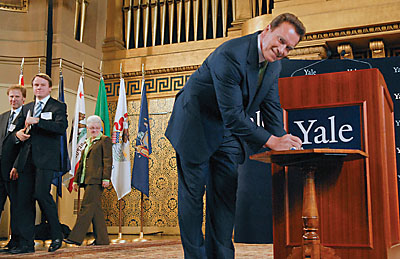 | California Governor Arnold Schwarzenegger signs the Declaration on Climate Change, which calls for mandatory federal and state action to reduce global warming. He was among the governors and representatives from 18 states to endorse the document, which warns "We have no time to lose." |
— By Susan Gonzalez
T H I S
U.S. governors call for federal action on
climate change during Yale conference
It is time to abandon “old ways of thinking” and the old-style
politics of Democrats versus Republicans and liberals versus conservatives
to confront the urgent issue of global climate change, California Governor
Arnold Schwarzenegger told a packed audience in Woolsey Hall on April 18.
Schwarzenegger gave the concluding address during the two-day Conference of
Governors on Climate Change, hosted by Yale. He was one of four state governors
during the event who publicly signed a historic declaration pledging to take
action in their own states to address the problem of climate change and to
call on the federal government to partner with states for that same cause.
The Woolsey Hall audience cheered enthusiastically as Schwarzenegger, Governor
Jodi Rell of Connecticut, Governor Jon Corzine of New Jersey and Governor Kathleen
Sebelius of Kansas signed the Declaration on Climate Change, which urges mandatory
federal and state action, monitoring and financial incentives as part of a
strategy to reduce global warming.
“To build this partnership we will coordinate our efforts and actively
solicit the support of all governors and members of Congress who are also serious
about the need to take action now to reduce emissions of greenhouse gases — at
all levels of government,” states the declaration. “In addition,
we will reach out to major presidential candidates as a means of shaping the
first 100 days of the next administration. We have no time to lose.”
The signing of the declaration took place during the final session of the conference,
which also featured a public address by Nobel laureate R.K. Pachauri, chair
of the United Nations’ Intergovernmental Panel on Climate Change (IPCC).
In addition to the four governors, representatives from 14 other states pledged
their support for the declaration on behalf of their state governments. Also
on hand to show support for the declaration were representatives from Mexico
and the Czech Republic, as well as two Canadian provincial premiers.
The Yale conference celebrated another historic meeting that took place 100
years ago when President Theodore Roosevelt held a landmark meeting of governors
at the White House that launched the modern conservation movement, planted
the seed for the National Parks System and inspired state efforts to protect
land.
The centennial gathering also celebrated Yale’s environmental tradition,
according to Dan Esty, the Hillhouse Professor of Environmental Law and Policy
and an organizer of the event. During his welcome address, Esty noted that
one of Roosevelt’s top advisers, Yale alumnus Gifford Pinchot, was present
at the May 1908 meeting. Pinchot, who graduated from Yale College in 1889,
played a critical role in the land conservation movement, served as the first
head of the National Forest Service and helped found Yale’s School of
Forestry & Environmental Studies (F&ES). Among the conference participants
were Roosevelt’s great-grandson, Theodore Roosevelt IV, and Pinchot’s
grandson, Gifford Pinchot III.
The conference featured discussion among the governors and other environmental
leaders and policymakers about state-level actions and innovations to confront
the problem of climate change. It culminated in the declaration signing and
public addresses in Woolsey Hall by Rell, who co-hosted the event with Yale,
Pachauri and Schwarzenegger.
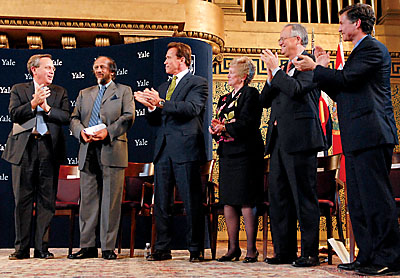
Woolsey Hall was filled to overflowing for the April 18 program. Participants included (from left) President Richard C. Levin, Nobel laureate R.K. Pachauri, California Governor Arnold Schwarzenegger, Connecticut Governor Jodi Rell, Yale School of Forestry & Environmental Studies Dean J. Gustave Speth and Professor Dan Esty.
State-level commitment
In his remarks at Woolsey Hall, Esty said the signing of the declaration represented
a “serious step forward” and demonstrated a bipartisan commitment
among the state leaders to addressing the challenge of climate change.
The 18 states that pledged their support for the declaration, Esty commented,
represent half of the U.S. population. These states also contribute more than
half of the nation’s greenhouse-gas (GHG) emissions. If those who signed
the declaration represented countries rather than states, he said, it would
be the equivalent — in total emissions — to four European countries:
Britain, France, Germany and Italy.
Yale President Richard C. Levin, who has become an international spokesperson
about the ways in which higher-education institutions can address climate change,
said the declaration signing at Yale was a “proud day” for the
University.
He noted the University had launched aggressive initiative to reduce its own
GHG emissions to 43% of its 2005 level by 2020 (the University has already
achieved a 17% reduction in the last two years alone). He lauded the efforts
of Yale faculty members who have been leaders in protecting the environment,
including Esty, who served as a chief negotiator for the 1992 U.N. Framework
Convention on Climate Change; and F&ES Dean J. Gustave Speth, who founded
two prominent environmental organizations — the Natural Resources Defense
Council and the World Resources Institute. Levin added that through its academic
programs, the University is helping to train and prepare students for “careers
as stewards of our environment.”
The University, he said, is demonstrating that a reduction in its carbon footprint
is “not only feasible but affordable,” noting that Yale will achieve
its GHG reduction goal at a cost of about 1% of its operating budget, possibly
even less.
“Who among us would not be willing to pay a tax of one-half of 1% to save
the planet?” he asked the audience.
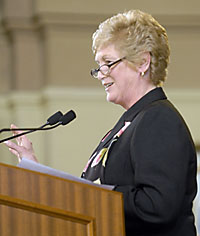
Rell described the "One Thing Project," launched last year, which urges Connecticut residents to take one action every day to conserve energy. Given the state's population, she said, "That would result in more than two billion 'one things' in the course of a year."
Levin praised Rell, Schwarzenegger and the other governors at the conference
for their climate change initiatives, but said that national legislation on
the issue is paramount. “I hope it will be enacted soon,” he stated.
Rell lauded Yale’s efforts to reduce GHG emissions and noted that the
University earned the state’s Climate Change Leadership Award last year.
She, too, said it was imperative to reach across party lines to take action
on climate change. She praised such collaborations as the Regional Greenhouse
Gas Initiative, a cooperative venture of Northeastern and Mid-Atlantic states
to reduce GHG emissions, and the Climate Registry, a voluntary GHG-emissions
reporting organization whose members include U.S. states, several Canadian
provinces and Mexican states.
“We must take steps to lower our carbon emissions not just to save this
planet but to set the challenge for a new economy,” Rell told the audience.
She cited a number of Connecticut industries, including United Technologies and
General Electric, which are committed to the development of “green-collar” jobs,
those that focus on improving the environment.
Last year, Rell urged Connecticut citizens to take one action every day to
conserve energy, such as unplugging cell phones and other electric appliances
and turning off lights — a campaign dubbed the “One Thing Project.”
“Think about this,” commented Rell. “There are three-and-a-half
million people in the state of Connecticut. If each of us did one thing every
single day, think about how many one things that really could be. That would
result in more than two billion ‘one things’ in the course of a year.”
Rell quoted Theodore Roosevelt, who said, “Believe you can and you’re
halfway there.” To which the governor added, “I believe we can
and I know you do, too.”
Global threats and warnings
Pachauri, who shared the Nobel Prize with former vice president Al Gore for
bringing environmental threats to the world’s attention, discussed some
of the challenges to the planet from an increase in global temperatures associated
with human activity.
“Climate change is part of a much larger problem,” he told the audience. “In
our drive toward industrialization, as we provide more goods and services to
human society, we’ve pursued a path of development that is unsustainable.”
He said the average increase in temperature in the 20th century was 0.74 Celsius,
a much higher increase than what the IPCC had predicted in one of its four
world environmental assessments.
“If you look at the warmest years in history, 11 of the 12 warmest have
occurred in the last 12 years,” Pachauri noted, adding that the changes
wrought by this temperature increase are now “observable” and that
anyone who still thinks that global warming is a myth is “naïve.”
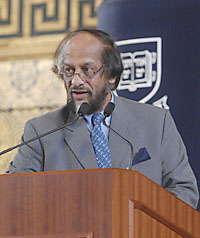
Eleven of the 12 warmest years in history occurred during the last dozen years, noted R.K. Pachauri, who shared the Nobel Prize with Al Gore for calling attention to the issue of global warming. He now chairs the United Nations Intergovernmental Panel on Climate Change.
The continued rise in temperature as a result of fossil fuels and GHG emissions,
Pachauri claimed, will result in an increase in severe droughts and floods,
extreme precipitation events (such as vast quantities of rainfall over a short
period of time) and changes in sea level. He said that glaciers are melting “at
such a rapid rate” that the entire world will eventually experience what
could be “abrupt and irreversible changes.” He added the possible
collapse of the ice shield in Greenland and west Antarctica could result in
the endangerment or extinction of 20% to 30% of species and put the lives of
hundreds of thousands of people at risk.
Further consequences of weather disruptions and other effects of climate change,
he said, include a decline in agriculture yields and productivity, an increase
in vector-borne diseases and lack of water in some places. He warned that these
problems would threaten world peace and stability, noting that there would
be rioting and demonstrations in countries where food and water become scarce.
If the world does not act to mitigate GHG emissions, Pachauri said, the resulting
problems will “exceed the capacity of human society to adapt” to
the environmental challenges it will face.
“The good news is that mitigation is not an expensive proposition,” commented
Pachauri, adding that the cost to the world economy is less than 3% of the GDP.
The lack of U.S. national leadership in the issue of climate change, Pachauri
told his audience, is affecting the country’s reputation throughout the
world. However, he praised the efforts of state governments for taking independent
action.
Pachauri urged nations to put a price on carbon to incorporate incentives into
the economic system. He also said lifestyle changes are important, agreeing
with Rell that a commitment to make such changes a part daily life are critical.
While acknowledging that the IPCC’s role is to make assessments rather
than recommendations, he said he personally thinks that people should eat less
meat.
“You’ll be healthier and so would the planet,” he said.
On a positive note, he said that in his home country of India, he has been
engaged in an innovative effort to bring energy to some of the 400 million
people there who don’t have electricity. In some villages, solar panels
are used to charge lanterns and flashlights in once-dark villages.
“We have to think outside the box,” Pachauri told the audience. “We
all live on one planet and we have to face the challenge together.”
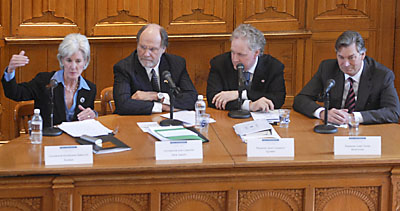
The conference included a panel at the Law School, where (from left) Kansas Governor Kathleen Sebelius, Governor John Corzine of New Jersey, Quebec Premier Jean Charest and Manitoba Premier Gary Doer discussed the innovative strategies that their states or provinces were pursuing to address global warming.
Growing momentum
California has the seventh largest economy in the world, and it is wielding
its influence to be a leader in enacting legislation and developing initiatives
that help to curb global warming, Schwarzenegger said in his talk.
He noted that his state has pledged to cut GHG emissions by 25% to 1990 standards
by 2020, and an additional 80% by 2050. Other measures the state has taken
include reducing the carbon content in transportation fuels, working to preserve
the state’s coastline and implementing a Green Building Initiative that
promotes the construction of more energy-efficient buildings. His state also
formed partnerships with other U.S. states as well as some Canadian provinces
and European nations to combat climate change.
“We don’t wait for Washington, because Washington is asleep at the
wheel,” he commented.
Schwarzenegger said he has been criticized for some of his initiatives, noting
that about a year ago, a billboard in Michigan proclaimed, “Arnold to
Michigan: Drop dead,” on account of the perception that his state’s
emission standards have hurt the auto industry.
“That’s not what I’m saying. I’m saying ‘Arnold
to Michigan: Get off your butt,’” he quipped.
“California may be doing more to save the U.S. auto industry because we’re
pushing it to change,” Schwarzenegger added.
Calling himself a “believer in technology,” the California governor
said he thinks that technological innovations will not only save Detroit but
will also save the American economy in general. He noted that his state is
on the leading edge in creating an “environmental economy,” in
which scientists and venture capitalist are “racing for new technology” that
is both “clean” and “green.”
“There is a huge pressure, fueled by billions of dollars, to find new sources
of energy,” Schwarzenegger told the audience, adding that “Capitalism — long
the alleged enemy of the environment — is giving new life” to the
environmental cause.
The California governor compared today’s environmental movement to body-building.
He said that when he first came to American 40 years ago, body-building was
an activity that most people were ashamed to say they engaged in, whereas eventually
discussion of “abs,” “six-packs” and other terms associated
with the sport became part of popular vocabulary. Similarly, while the environmental
movement was once associated with “tree-huggers” and “weird
fanatics,” it has become “hip, cutting-edge, self-confident, even
sexy,” he said.
Schwarzenegger acknowledged that trying to “guilt” people out of
buying big-screen televisions and other energy-using gadgetry is not likely
to accomplish anything.
“I don’t think any movement has ever made much progress based on
guilt,” he commented. “Guilt is passive, inhibitive. Successful movements
are built on passion, on confidence, on Teddy Roosevelt’s bully pulpit,
on critical mass. The environmental movement has switched from being powered
by guilt to something much more positive and dynamic … capable of bringing
about revolutionary change.”
Schwarzenegger, a Republican, told the audience that he believes that whichever
presidential candidate wins the election, the new U.S. leader will support
national legislation to deal with climate change.
“Things will pick up speed after inauguration day,” the governor
said. “We know that for sure.”
He also noted that some measures that would benefit the environment have been
blocked equally by Democrats and Republicans, as well as by environmental activists.
He cited a plan in California to build a solar facility that has been challenged
by the Department of Fish and Game on the basis that it could endanger the
habitat of a squirrel “never before seen.”
“So a squirrel that may not exist is holding up environmental progress,” Schwarzenegger
said. “If we can’t put a solar plant in the Mojave Desert, I don’t
know where we can put it.
“This is the real world,” he continued. “We have to make tradeoffs.
I think both environmental activists and their opponents cannot let ‘perfect’ become
the enemy of the ‘possible.’ The fact of the matter is, nothing is
perfect.”
Schwarzenegger urged the many students in his audience to be open-minded in
their search for creative solutions to environmental challenges.
“Do not accept or dismiss anything because it has a label — a Republican
label or a Democratic label, a conservative label or a liberal label. Think for
yourself,” he said. “I have great faith in you to find good new approaches. … Stir
things up. Be fresh in the way you look at things. I believe in what you can
accomplish.”
While acknowledging there are great challenges ahead in dealing with the issue
of climate change, Schwarzenegger asked his audience members not to be pessimistic
about the ability to solve them.
“You can feel big things moving,” he said. “You can feel big
things coming together. … Every day I see things happening in California
and I tell you, things are starting to move our way.”
The conference can be viewed on video at www.yale.edu/climateleaders.
 W E E K ' S
W E E K ' S S T O R I E S
S T O R I E S![]()
 U.S. governors call for federal action on climate change . . .
U.S. governors call for federal action on climate change . . .![]()
![]()
 Law School boosts support for careers in public service
Law School boosts support for careers in public service![]()
![]()
 City youths to flex their mathematical muscles in contest
City youths to flex their mathematical muscles in contest![]()
![]()
 Fertility expert finds genetic markers that are linked with . . .
Fertility expert finds genetic markers that are linked with . . .![]()
![]()
 Divinity student’s books pay homage to architectural marvels
Divinity student’s books pay homage to architectural marvels![]()
![]()
 United Way honors the University and staff member . . .
United Way honors the University and staff member . . .![]()
![]()
 Ways to curb ovarian cancer’s resistance to chemotherapy . . .
Ways to curb ovarian cancer’s resistance to chemotherapy . . .![]()
![]()
 Yale Rep stages world premiere of ‘Boleros for the Disenchanted’
Yale Rep stages world premiere of ‘Boleros for the Disenchanted’![]()
![]()
 Program seeks to build bridges of religious environmentalism
Program seeks to build bridges of religious environmentalism![]()
![]()
 Conference aims to spark ‘new American conversation’ . . .
Conference aims to spark ‘new American conversation’ . . .![]()
![]()
 Reading will feature recent winners of Yale Series of . . .
Reading will feature recent winners of Yale Series of . . .![]()
![]()
 Photography exhibit highlights culture of Uyghur people of China
Photography exhibit highlights culture of Uyghur people of China![]()
![]()
 Dr. Gerald Shulman lauded for his pioneering work on insulin resistance
Dr. Gerald Shulman lauded for his pioneering work on insulin resistance![]()
![]()
 Amy Arnsten wins national grant for research on . . .
Amy Arnsten wins national grant for research on . . .![]()
![]()
 Yale hosts delegation from China’s Food and Drug Administration
Yale hosts delegation from China’s Food and Drug Administration![]()
![]()
 New director of development for School of Music is appointed
New director of development for School of Music is appointed![]()
IN MEMORIAM
 Dr. Steven Hebert: Discoveries illuminated kidney processes
Dr. Steven Hebert: Discoveries illuminated kidney processes![]()
 G.K. Hunter: Was a scholar of Renaissance literature
G.K. Hunter: Was a scholar of Renaissance literature![]()
![]()
 Let the sun shine
Let the sun shine![]()
![]()
 Campus Notes
Campus Notes![]()
Bulletin Home |
| Visiting on Campus
Visiting on Campus |
| Calendar of Events
Calendar of Events |
| In the News
In the News![]()
Bulletin Board |
| Classified Ads
Classified Ads |
| Search Archives
Search Archives |
| Deadlines
Deadlines![]()
Bulletin Staff |
| Public Affairs
Public Affairs |
| News Releases
News Releases |
| E-Mail Us
E-Mail Us |
| Yale Home
Yale Home